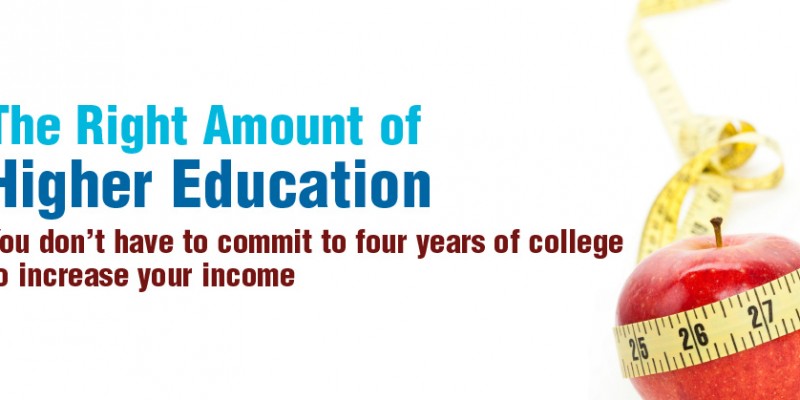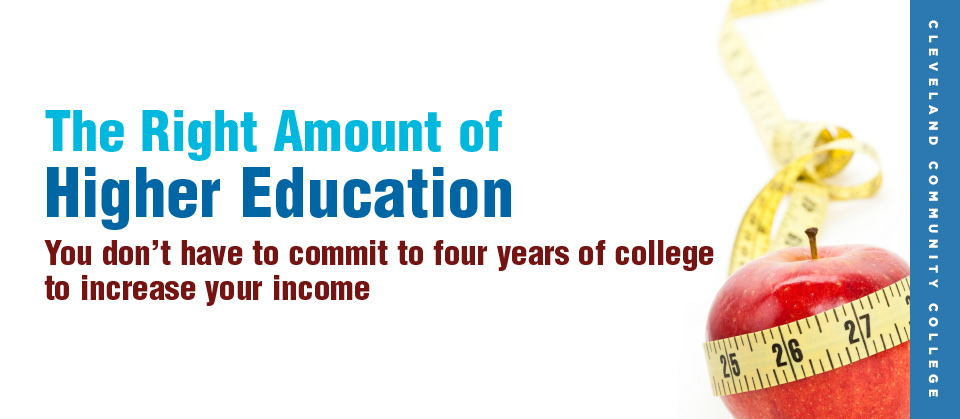
You don’t have to commit to four years of college to increase your income
In choosing a career, it’s important to know your personal interests and talents, the job outlook for occupations matching your interests and talents, the education required, and the earnings you can expect—annually and over a lifetime.
Several recent economic studies shed light on the outlook for national and local jobs, and help answer the question, “How much higher education do I need?”
More job openings for
skilled workers
A 2010 study from Georgetown University “Help Wanted: Projections of Jobs and Education Requirements through 2018,” included these two conclusions:
By 2018, the U.S. economy will create 46.8 million job openings and 63 percent of these will require workers with at least some college education.
By 2018, the postsecondary system will have produced 3 million fewer college graduates than demanded by the labor market.
While 65 percent of workers with a high school diploma and no college experience have household incomes placing them in the middle class or above, completion of an associate’s degree raises this proportion to 80 percent. Earning a bachelor’s degree pushes the proportion in the middle class or above to 86 percent.
Middle-skills jobs on the rise
One in every five jobs and nearly half of those that pay $35,000 or more a year are “middle-skills” jobs that require training beyond high school, but less than a bachelor’s degree.
These jobs include nurses, computer support specialists, auto mechanics, dental hygienists, fitness trainers, heating and air conditioning mechanics, hairstylists, paralegals, pre-school teachers, and medical laboratory technicians.
These middle-skill jobs are quite varied. In some you work with your hands, some you work with logic
and numbers, and in others you work with people.
Middle-skills jobs and
middle-class pay
In The College Payoff, labor market economists at Georgetown University indicate that 28 percent of workers with an associate’s degree earned more than the median earnings of workers with bachelor’s degrees.
That’s worth repeating: Nearly 3 in 10 workers with associate’s degrees earn more than half of the workers with bachelor’s degrees. The high earnings of registered nurses have a lot to do with that, but it’s not just nurses.
The economic benefit of additional education and training over a lifetime can be substantial.
Some postsecondary education, even without earning a degree, adds nearly one-quarter of a million dollars to lifetime earnings.
An associate’s degree is worth over $420,000 in lifetime earnings above what you can expect to earn as a high school graduate.
Add it up and the middle looks like a pretty nice place to be!
Craig Clagett,
Laura Lyjak Crawford
CCC
At Cleveland Community College we understand how important an associate degree can be to your bank account and a recent report by Jon Marcus at The Hechinger Institute says that an increase in wages for community college grads is being driven by a high-demand for people with so-called “middle-skills” that often require no more than an associate’s degree, such as lab technicians, teachers in early childhood programs, computer engineers, draftsmen, and machinists. In Virginia, recent graduates of occupational and technical degree programs at its community colleges make an average of $40,000. That’s almost $2500 more than a recent graduate with a bachelor’s degree.
In the article, Mark Schneider, vice president of the American Institute for Research, says by mid-career, many bachelor’s degree recipients have caught up in earnings to community college grads, “the other facto that has to be taken into account is that getting a four-year degree can be much more expensive that getting a two-year degree,” Schneider says.
Earning an associate’s degree at CCC will cost $1,351.00 per year compared to tuition costs of up to $7,778 at four-year colleges and universities and up to $41,938 at four-year private colleges and universities. Source: Web sites of area colleges and universities
Jeff Strohl, director of research at Georgetown University’s Center on Education and the Workforce, says, the center estimates that 29 million jobs paying middle class wages today require only an associate’s and not a bachelor’s degree. “I would not suggest anyone look down their nose at the associate degree,” says Strohl.

